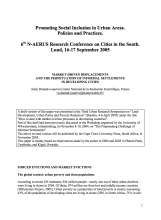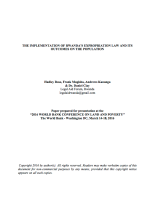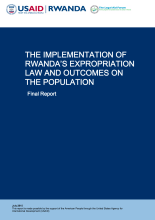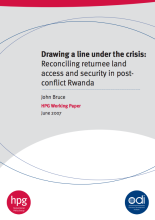/ library resources
Showing items 118 through 126 of 136.Since mid-1970s, a great number of rural-urban migrants are converging towards Kigali, the capital of Rwanda, and secondary towns, putting strain on land, especially of urban fringes.
According to recent UN estimates, 924 million people - nearly one out of three urban dwellers – were living in slums in 2004. Of these, 874 million are from low and middle-income countries (Millennium Project, 2005).
Rwanda is developing at a remarkably rapid pace, and with that development has come a multitude of corresponding changes to the orientation and use of land throughout the country.
This Policy Brief summarizes the main findings and recommendations of qualitative and quantative research on implementation and outcomes of the 2007 Expropriation Law in Rwanda.
This policy brief aims to inform policy and current practices governing land expropriation in Rwanda drawing on recent research carried out by the LAND Project.
This report is part of a broader comparative effort by As the author worked with colleagues in Rwanda,
two other important dimensions of the Rwandan
experience became clear. Refugee return and land
access in Rwanda has been an extraordinarily
This background briefing reports on a study of land access for returnees in Rwanda, and the impacts of land access policies in the post-conflict period.
Conflits armés et crises alimentaires contribuent à leur manière à urbaniser
l’Afrique sub-saharienne lorsque les villes jouent un rôle de refuge et que les combats
se déroulent à la campagne. Malgré l’évacuation de ses habitants lors de la chute du
To accommodate the needs of hundreds of thousands of returnees after war and fgenocide in 1994, the new Rwandan Government launched a settlement programme, Imidugudu.
Paginação
Land Library Search
Through our robust search engine, you can search for any item of the over 73,000 highly curated resources in the Land Library.
If you would like to find an overview of what is possible, feel free to peruse the Search Guide.







